外研版九年级下册Module 3 Life now and then Unit 1课件(共27张PPT,内嵌音视频)
文档属性
| 名称 | 外研版九年级下册Module 3 Life now and then Unit 1课件(共27张PPT,内嵌音视频) |
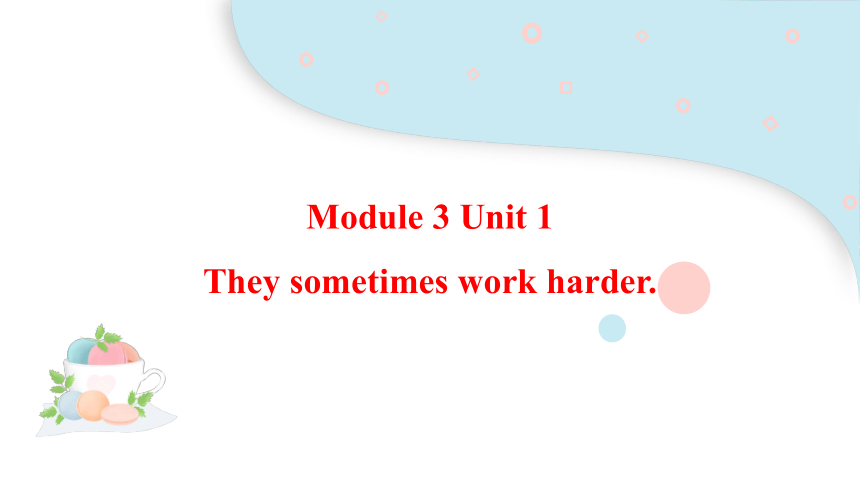
|
|
| 格式 | pptx | ||
| 文件大小 | 36.5MB | ||
| 资源类型 | 教案 | ||
| 版本资源 | 外研版 | ||
| 科目 | 英语 | ||
| 更新时间 | 2025-04-27 20:19:45 | ||
图片预览

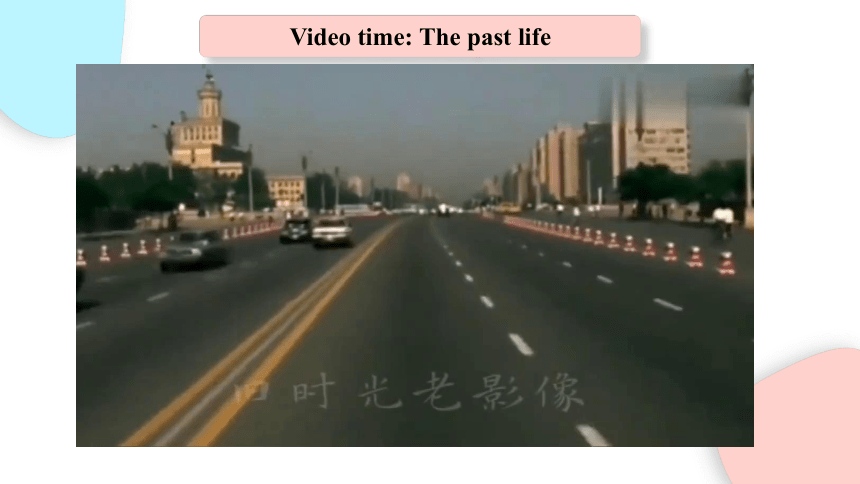
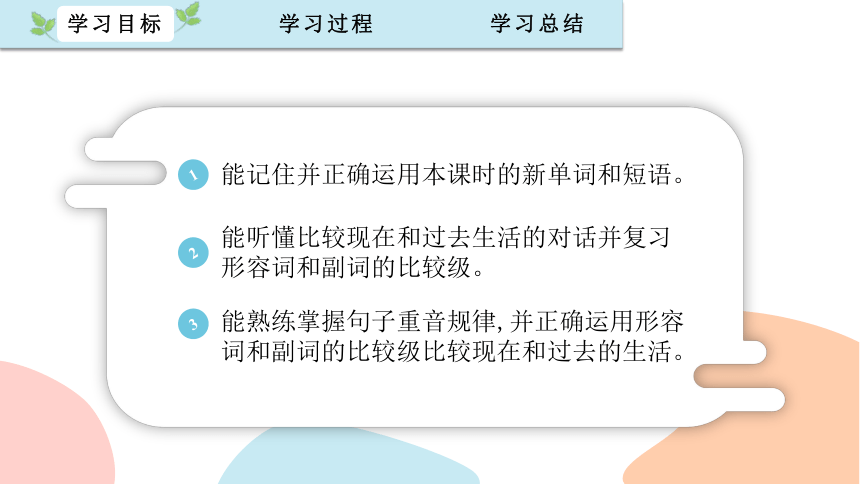
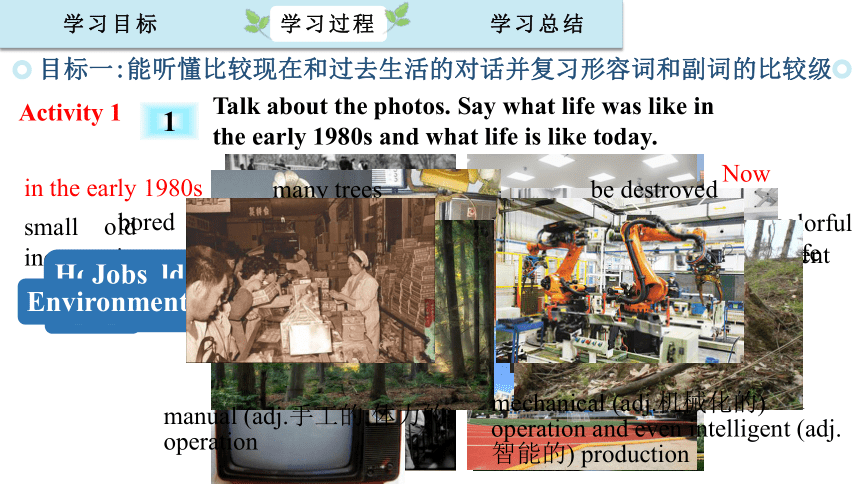
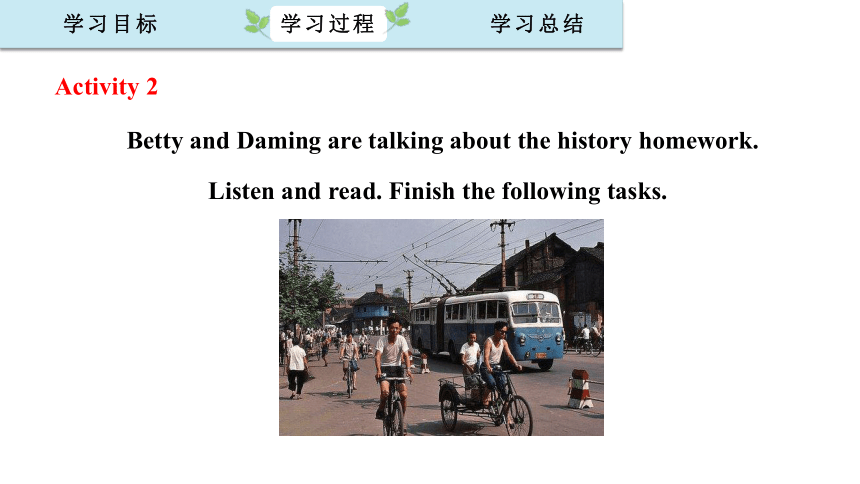
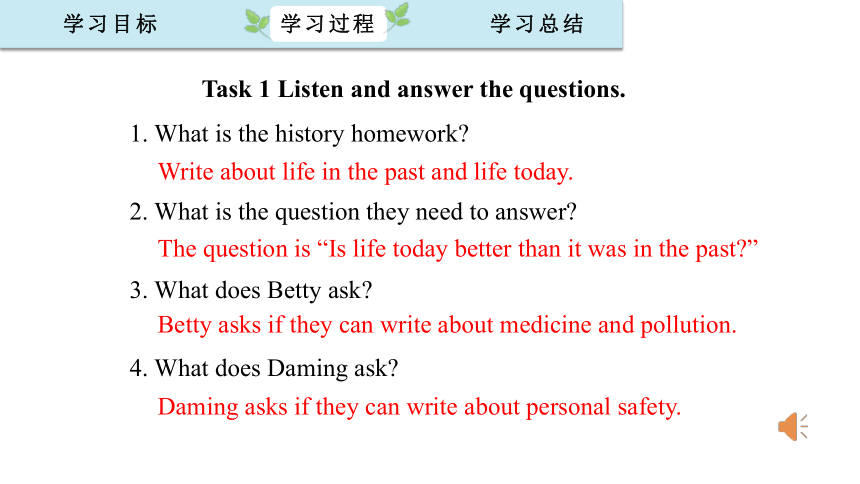
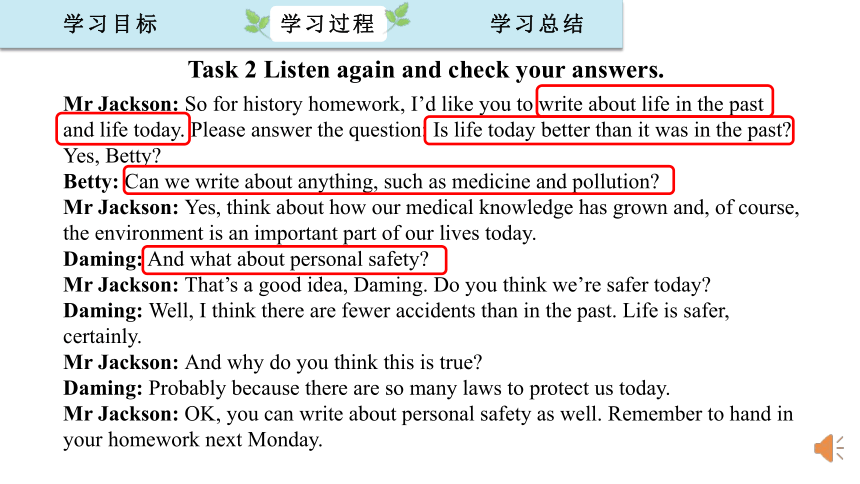
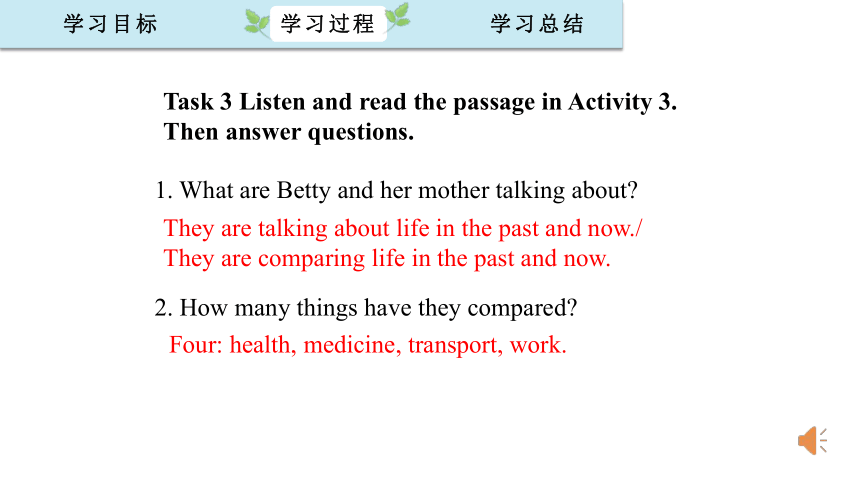
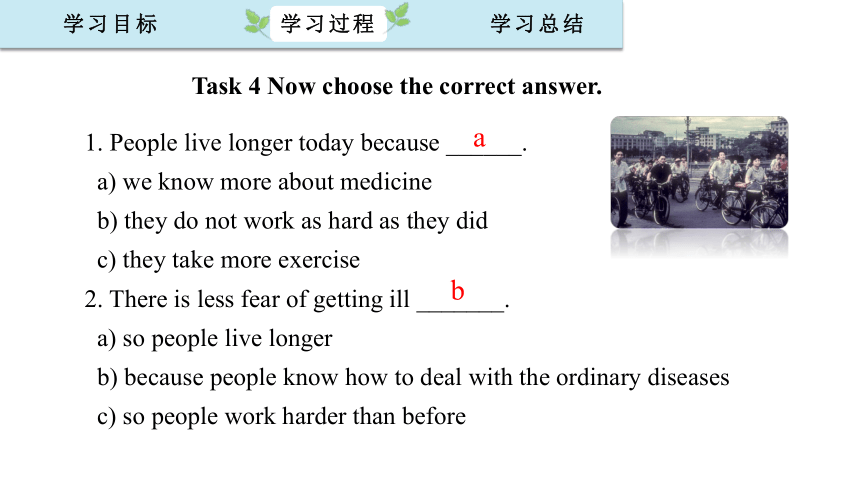
文档简介
Module 3 Unit 1
They sometimes work harder.
Video time: The past life
1
2
能记住并正确运用本课时的新单词和短语。
3
能听懂比较现在和过去生活的对话并复习形容词和副词的比较级。
能熟练掌握句子重音规律,并正确运用形容词和副词的比较级比较现在和过去的生活。
目标一:能听懂比较现在和过去生活的对话并复习形容词和副词的比较级
Activity 1
1
Talk about the photos. Say what life was like in the early 1980s and what life is like today.
House
in the early 1980s
Now
small
inconvenient
big
convenient
Education
more colorful school life
bored
Household
equipment
morden
old
Environment
many trees
be destroyed
Jobs
mechanical (adj.机械化的) operation and even intelligent (adj.智能的) production
manual (adj.手工的;体力的) operation
Activity 2
Betty and Daming are talking about the history homework.
Listen and read. Finish the following tasks.
Task 1 Listen and answer the questions.
1. What is the history homework?
2. What is the question they need to answer?
3. What does Betty ask?
4. What does Daming ask?
Write about life in the past and life today.
The question is “Is life today better than it was in the past?”
Betty asks if they can write about medicine and pollution.
Daming asks if they can write about personal safety.
Task 2 Listen again and check your answers.
Mr Jackson: So for history homework, I’d like you to write about life in the past and life today. Please answer the question: Is life today better than it was in the past? Yes, Betty?
Betty: Can we write about anything, such as medicine and pollution?
Mr Jackson: Yes, think about how our medical knowledge has grown and, of course, the environment is an important part of our lives today.
Daming: And what about personal safety?
Mr Jackson: That’s a good idea, Daming. Do you think we’re safer today?
Daming: Well, I think there are fewer accidents than in the past. Life is safer, certainly.
Mr Jackson: And why do you think this is true?
Daming: Probably because there are so many laws to protect us today.
Mr Jackson: OK, you can write about personal safety as well. Remember to hand in your homework next Monday.
Task 3 Listen and read the passage in Activity 3. Then answer questions.
1. What are Betty and her mother talking about?
2. How many things have they compared?
They are talking about life in the past and now./ They are comparing life in the past and now.
Four: health, medicine, transport, work.
Task 4 Now choose the correct answer.
People live longer today because ______.
a) we know more about medicine
b) they do not work as hard as they did
c) they take more exercise
2. There is less fear of getting ill _______.
a) so people live longer
b) because people know how to deal with the ordinary diseases
c) so people work harder than before
a
b
3. People take less exercise because _______.
a) they do not need to
b) they drive cars instead
c) they do not have cars or bikes
4. People work harder today and ________.
a) they do not live as long as they did
b) they do not usually have enough free time
c) they live a healthier life
b
b
Task 5: Read and repeat.
找出文章中的比较级和比较级的常用句型,并翻译。
用形容词和副词的比较级来比较人或事物。常用句型:A+比较级(+than +B),比……更……。
同级比较:as… as…,
否定句:not so/as…as…。
填一填
Revision
原级
比较级
原级
比较级
better
less
wealthier
simpler
longer
healthier
more
worse
good
wealthy
long
much
little
simple
healthy
bad
观察表格,并回忆归纳形容词、副词的比较级的变化规则。
构成法
原级
比较级
一般单音节词末尾加
-er
tall
great
taller
greater
以不发音的e结尾的单音词只加-r
nice
large
nicer
larger
辅+元+辅结构的双写结尾的
辅音字母,再加-er
big
hot
bigger
hotter
辅音字母+y结尾的词改y为i加-er
heavy
funny
heavier
funnier
多音节词和部分双音节词前加more构成比较级
quickly
important
more quickly
more important
Activity 3
Work in groups. Find out some language points that you think are important and share their use with your classmates and give some examples.
Language points:_______________________
_____________________________________
_____________________________________
____________________________________
_____________________________
Language points
1. … because we know how to deal with the ordinary diseases.
因为我们知道如何治疗普通疾病。
deal?with意思是“处理;安排;对付 ”,常与疑问副词how搭配使用。
如:How will you deal with the event? 你将如何处理此事?
how to deal with sth.意为“如何处理某事”,相当于how引导的宾语从句 how we should deal with …。
如:Please tell me how to deal with this event.
= Please tell me how I should deal with this event.
请告诉我如何处理此事。
Language points
2. But people don’t take as much exercise as they used to.
但是人们不像过去那样做很多运动了。
(1) as … as … 意为“像……一样……”,常用于同级比较,其否定形式为 not as / so … as …。主要用法如下:
①“as + 形容词 / 副词的原级 + as ”结构表示两者在某方面相同或相近。
如:This film is as interesting as that one. 这部电影和那部电影一样有趣。
② “倍数 + as + 形容词 / 副词的原级 + as”结构可表示两者间的倍数关系。
如:This ruler is twice as long as that one. 这把尺子是那把尺子的两倍长。
(2) used?to?do?sth.指“过去常常做某事”,没有人称和数的变化,其后常接动词原形。否定形式有两种:didn’t?use?to或used?not?to。
如:
I didn’t use to live there when I was a child.
I used not to live there when I was a child.
我小的时候不经常住在那儿。
3. I suppose that’s because more people have cars…
我想可能是因为更多的人有了车……
suppose表示“猜想”、“认为”,相当于think或guess。后接否定的宾语从句时通常将否定转移到主句上。
如:I don’t suppose he is really ill. 我看他不是真病了。
4. When the number of cars is doubled, the pollution is also doubled, or even worse. 当汽车的数量加倍时,污染也加倍,甚至更糟。
the number of 意为“……的数量”。跟复数名词连用作主语时,中心词是number, 谓语动词要用单数。
如:
a number of 相当于many,意为“许多”,修饰可数名词复数。作主语时,谓语动词用复数。number前可加large, small 等修饰,表示程度。
如:A number of / Many students are playing games. 许多学生在做游戏。
5. People seldom say they have enough spare time!
人们很少说他们有足够的空闲时间!
(1) seldom 副词,意为“不常,很少”,相当于not often,表否定含义。如:They seldom play football these days. 这些日子他们很少踢足球。
(2) spare 形容词,意为“空闲的,多余的”,常构成固定短语 in one’s spare time,意为“在某人的空闲时间”。
如:What do you like doing in your spare time? 你闲暇时喜欢做什么?
4
Complete the questions with the words or expressions in the box.
deaf doubled fear spare used to wealth
1. What kinds of things do you _______?
2. What do you do in your _______ time?
3. What can someone not do if they are _______?
4. If something is _______, is it more or less?
5. Do you think people ________ take more exercise than they do today?
6. Do you think people have more _______ today than they used to?
fear
spare
doubled
used to
wealth
deaf
Now work in pairs. Ask and answer.
目标二:能熟练掌握句子重音规律, 运用形容词和副词的比较级比较现在和过去的生活
Activity 1
6
Read and predict which words the speaker is likely to stress.
Now listen and check.
回忆一下重读规则,哪些词需要重读,哪些不需要?
Some people think life in the past was simpler and healthier than today. More wealth sometimes means less health. When the number of cars is doubled, the pollution is also doubled, or even worse.
一般来说,实词(名词、实意动词、形容词、副词等)需要重读,
虚词(介词、连词、冠词等)不需要重读。
Stress 重读
6
Read the paragraph in Activity 5 aloud.
Some people think life in the past was simpler and healthier than today. More wealth sometimes means less health. When the number of cars is doubled, the pollution is also doubled, or even worse.
Activity 2
Role play
Role play the conversation in activity 3 of the textbook.
Pay attention to the stress words.
Activity 3
7
Work in pairs. Answer the question and give your reasons.
— Is life better today than in the past?
— Yes, it is. I think it’s better because... / No, it isn’t. I think...
Now say what is better or worse in:
education
environment
health
Do you know how to compare life
in the past and now?
Summary
They sometimes work harder.
Video time: The past life
1
2
能记住并正确运用本课时的新单词和短语。
3
能听懂比较现在和过去生活的对话并复习形容词和副词的比较级。
能熟练掌握句子重音规律,并正确运用形容词和副词的比较级比较现在和过去的生活。
目标一:能听懂比较现在和过去生活的对话并复习形容词和副词的比较级
Activity 1
1
Talk about the photos. Say what life was like in the early 1980s and what life is like today.
House
in the early 1980s
Now
small
inconvenient
big
convenient
Education
more colorful school life
bored
Household
equipment
morden
old
Environment
many trees
be destroyed
Jobs
mechanical (adj.机械化的) operation and even intelligent (adj.智能的) production
manual (adj.手工的;体力的) operation
Activity 2
Betty and Daming are talking about the history homework.
Listen and read. Finish the following tasks.
Task 1 Listen and answer the questions.
1. What is the history homework?
2. What is the question they need to answer?
3. What does Betty ask?
4. What does Daming ask?
Write about life in the past and life today.
The question is “Is life today better than it was in the past?”
Betty asks if they can write about medicine and pollution.
Daming asks if they can write about personal safety.
Task 2 Listen again and check your answers.
Mr Jackson: So for history homework, I’d like you to write about life in the past and life today. Please answer the question: Is life today better than it was in the past? Yes, Betty?
Betty: Can we write about anything, such as medicine and pollution?
Mr Jackson: Yes, think about how our medical knowledge has grown and, of course, the environment is an important part of our lives today.
Daming: And what about personal safety?
Mr Jackson: That’s a good idea, Daming. Do you think we’re safer today?
Daming: Well, I think there are fewer accidents than in the past. Life is safer, certainly.
Mr Jackson: And why do you think this is true?
Daming: Probably because there are so many laws to protect us today.
Mr Jackson: OK, you can write about personal safety as well. Remember to hand in your homework next Monday.
Task 3 Listen and read the passage in Activity 3. Then answer questions.
1. What are Betty and her mother talking about?
2. How many things have they compared?
They are talking about life in the past and now./ They are comparing life in the past and now.
Four: health, medicine, transport, work.
Task 4 Now choose the correct answer.
People live longer today because ______.
a) we know more about medicine
b) they do not work as hard as they did
c) they take more exercise
2. There is less fear of getting ill _______.
a) so people live longer
b) because people know how to deal with the ordinary diseases
c) so people work harder than before
a
b
3. People take less exercise because _______.
a) they do not need to
b) they drive cars instead
c) they do not have cars or bikes
4. People work harder today and ________.
a) they do not live as long as they did
b) they do not usually have enough free time
c) they live a healthier life
b
b
Task 5: Read and repeat.
找出文章中的比较级和比较级的常用句型,并翻译。
用形容词和副词的比较级来比较人或事物。常用句型:A+比较级(+than +B),比……更……。
同级比较:as… as…,
否定句:not so/as…as…。
填一填
Revision
原级
比较级
原级
比较级
better
less
wealthier
simpler
longer
healthier
more
worse
good
wealthy
long
much
little
simple
healthy
bad
观察表格,并回忆归纳形容词、副词的比较级的变化规则。
构成法
原级
比较级
一般单音节词末尾加
-er
tall
great
taller
greater
以不发音的e结尾的单音词只加-r
nice
large
nicer
larger
辅+元+辅结构的双写结尾的
辅音字母,再加-er
big
hot
bigger
hotter
辅音字母+y结尾的词改y为i加-er
heavy
funny
heavier
funnier
多音节词和部分双音节词前加more构成比较级
quickly
important
more quickly
more important
Activity 3
Work in groups. Find out some language points that you think are important and share their use with your classmates and give some examples.
Language points:_______________________
_____________________________________
_____________________________________
____________________________________
_____________________________
Language points
1. … because we know how to deal with the ordinary diseases.
因为我们知道如何治疗普通疾病。
deal?with意思是“处理;安排;对付 ”,常与疑问副词how搭配使用。
如:How will you deal with the event? 你将如何处理此事?
how to deal with sth.意为“如何处理某事”,相当于how引导的宾语从句 how we should deal with …。
如:Please tell me how to deal with this event.
= Please tell me how I should deal with this event.
请告诉我如何处理此事。
Language points
2. But people don’t take as much exercise as they used to.
但是人们不像过去那样做很多运动了。
(1) as … as … 意为“像……一样……”,常用于同级比较,其否定形式为 not as / so … as …。主要用法如下:
①“as + 形容词 / 副词的原级 + as ”结构表示两者在某方面相同或相近。
如:This film is as interesting as that one. 这部电影和那部电影一样有趣。
② “倍数 + as + 形容词 / 副词的原级 + as”结构可表示两者间的倍数关系。
如:This ruler is twice as long as that one. 这把尺子是那把尺子的两倍长。
(2) used?to?do?sth.指“过去常常做某事”,没有人称和数的变化,其后常接动词原形。否定形式有两种:didn’t?use?to或used?not?to。
如:
I didn’t use to live there when I was a child.
I used not to live there when I was a child.
我小的时候不经常住在那儿。
3. I suppose that’s because more people have cars…
我想可能是因为更多的人有了车……
suppose表示“猜想”、“认为”,相当于think或guess。后接否定的宾语从句时通常将否定转移到主句上。
如:I don’t suppose he is really ill. 我看他不是真病了。
4. When the number of cars is doubled, the pollution is also doubled, or even worse. 当汽车的数量加倍时,污染也加倍,甚至更糟。
the number of 意为“……的数量”。跟复数名词连用作主语时,中心词是number, 谓语动词要用单数。
如:
a number of 相当于many,意为“许多”,修饰可数名词复数。作主语时,谓语动词用复数。number前可加large, small 等修饰,表示程度。
如:A number of / Many students are playing games. 许多学生在做游戏。
5. People seldom say they have enough spare time!
人们很少说他们有足够的空闲时间!
(1) seldom 副词,意为“不常,很少”,相当于not often,表否定含义。如:They seldom play football these days. 这些日子他们很少踢足球。
(2) spare 形容词,意为“空闲的,多余的”,常构成固定短语 in one’s spare time,意为“在某人的空闲时间”。
如:What do you like doing in your spare time? 你闲暇时喜欢做什么?
4
Complete the questions with the words or expressions in the box.
deaf doubled fear spare used to wealth
1. What kinds of things do you _______?
2. What do you do in your _______ time?
3. What can someone not do if they are _______?
4. If something is _______, is it more or less?
5. Do you think people ________ take more exercise than they do today?
6. Do you think people have more _______ today than they used to?
fear
spare
doubled
used to
wealth
deaf
Now work in pairs. Ask and answer.
目标二:能熟练掌握句子重音规律, 运用形容词和副词的比较级比较现在和过去的生活
Activity 1
6
Read and predict which words the speaker is likely to stress.
Now listen and check.
回忆一下重读规则,哪些词需要重读,哪些不需要?
Some people think life in the past was simpler and healthier than today. More wealth sometimes means less health. When the number of cars is doubled, the pollution is also doubled, or even worse.
一般来说,实词(名词、实意动词、形容词、副词等)需要重读,
虚词(介词、连词、冠词等)不需要重读。
Stress 重读
6
Read the paragraph in Activity 5 aloud.
Some people think life in the past was simpler and healthier than today. More wealth sometimes means less health. When the number of cars is doubled, the pollution is also doubled, or even worse.
Activity 2
Role play
Role play the conversation in activity 3 of the textbook.
Pay attention to the stress words.
Activity 3
7
Work in pairs. Answer the question and give your reasons.
— Is life better today than in the past?
— Yes, it is. I think it’s better because... / No, it isn’t. I think...
Now say what is better or worse in:
education
environment
health
Do you know how to compare life
in the past and now?
Summary
同课章节目录
- Module 1 Travel
- Unit 1 We toured the city by bus and by taxi
- Unit 2 It's a long story.
- Unit 3 Language in use
- Module 2 Education
- Unit 1 They don't sit in rows.
- Unit 2 What do I like best about school?
- Unit 3 Language in use
- Module 3 Life now and then
- Unit 1 They sometimes work harder.
- Unit 2 I think life is better today.
- Unit 3 Language in use.
- Module 4 Rules and suggestions
- Unit 1 You must be careful of falling stones.
- Unit 2 we must keep the camp clean.
- Unit 3 Language in use.
- Revison A
- Module 5 Look after yourself
- Unit 1 We'd better get you to hospital.
- Unit 2 Get off the sofa!
- Unit 3 Language in use.
- Module 6 Eating togethe
- Unit 1 When is the school-leavers' party?
- Unit 2 Knives and forks are used for most Western
- Unit 3 Language in use
- Module 7 English for you and me
- Unit 1 Have you ever been to an English corner?
- Unit 2 We all own English.
- Unit 3 Language in use
- Module 8 My future life
- Unit 1 Here's to our friendship and the future
- Unit 2 I know that you will be better at maths.
- Unit 3 Language in use
- Revison B
